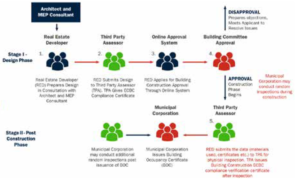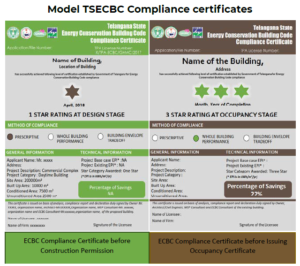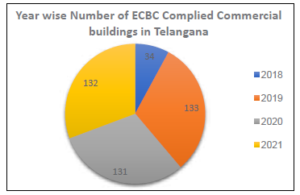Telangana is one of the leading states in India to adopt mandatory Energy Conservation Building Code (ECBC) and first in the country to incorporate the mandatory compliance through online building approval system
Pavan Kumar Parnandi, Consultant – Energy Conservation, TSREDCO
 Energy Conservation Building Code (ECBC) sets minimum energy efficiency standards for the most energy intensive building features i.e., saving energy wherever to the greatest extent in the building. ECBC covers the five broad energy intensives are as in the building such as Building envelope (walls, roof, windows), Lighting, HVAC systems, Service hot water system & Electrical systems etc.
Energy Conservation Building Code (ECBC) sets minimum energy efficiency standards for the most energy intensive building features i.e., saving energy wherever to the greatest extent in the building. ECBC covers the five broad energy intensives are as in the building such as Building envelope (walls, roof, windows), Lighting, HVAC systems, Service hot water system & Electrical systems etc.
 The Code was developed and launched by Bureau of Energy Efficiency, GoI for addressing the energy efficiency component in the built environment with reference to the rapid urbanization and growth of commercial built environment across country. As per EC Act 2001, State has the power to adopt the Code to suit their climate conditions. Knowing the advantage of the ECBC, Government has made ECBC as mandatory for the commercial buildings and other Non- Residential Buildings that have a plot area of more than 1000 Square Meters or built-up area of 2000 Square Meters. Certain categories of buildings such as Multiplexes, Hospitals, Hotels, and Convention Centers irrespective of their built-up area. Further, Government of Telangana incorporated mandatory provisions of ECBC in the Telangana State Municipalities Act 2019.
The Code was developed and launched by Bureau of Energy Efficiency, GoI for addressing the energy efficiency component in the built environment with reference to the rapid urbanization and growth of commercial built environment across country. As per EC Act 2001, State has the power to adopt the Code to suit their climate conditions. Knowing the advantage of the ECBC, Government has made ECBC as mandatory for the commercial buildings and other Non- Residential Buildings that have a plot area of more than 1000 Square Meters or built-up area of 2000 Square Meters. Certain categories of buildings such as Multiplexes, Hospitals, Hotels, and Convention Centers irrespective of their built-up area. Further, Government of Telangana incorporated mandatory provisions of ECBC in the Telangana State Municipalities Act 2019.
Telangana is one of the leading states in India to adopt mandatory Energy Conservation Building Code (ECBC) and first in the country to incorporate the mandatory compliance through online building approval system and practically implementing the same successfully. The following implementation framework for ECBC has been developed by the ECBC technical committee and has been recognized as best implementation framework in India.
Following are the steps that shall be followed by Real Estate Developer/Owner/Builder for ECBC compliance as per the ECBC compliance framework
 Step 1 For ECBC Complied construction, Real Estate Developer (RED)/ Owner/ Builder shall submit building design with the support of any Architect or ECBC Consultant.
Step 1 For ECBC Complied construction, Real Estate Developer (RED)/ Owner/ Builder shall submit building design with the support of any Architect or ECBC Consultant.
Step 2 Licensed ECBC Third Party Assessor will verify the submitted designs and recommends necessary measures for ECBC compliance and certifies the design along with simulation report.
Step 3 The RED/Owner/ Builder Submits the modified designs along with Certificate issued by Licensed ECBC Third Party Assessor.
Step 4 Urban Local body gives the permission for construction.
Step 5 During the Construction Phase of the building ULB may do random inspections. Step 6 Before Occupancy Certificate, RED/owner/ builder submits the data (materials used, certificates etc.) to Licensed ECBC TPA for physical inspection- Licensed ECBC TPA after inspection issues ECBC compliance verification certificate mentioning Building Construction is as per ECBC Compliance.
Step 7 RED/Owner/Builder will submit the same to ULB for Occupancy Certificate
Step 8 Urban Local Body Issues Occupancy Certificate after inspecting the ECBC compliance certificate.
 Status of ECBC Implementation in Telangana
Status of ECBC Implementation in Telangana
- Since 2018, the code is under mandatory implementation in the state through DPMS of GHMC and DTCP.
- In Telangana State, as of now 430 commercial buildings were compiled as per ECBC with total built-up area of 13.12 Lakh m2 (WBP – 11.94 Lakh m2, prescriptive – 1.04 Lakh m2). The year wise number of ECBC complied Buildings in the state are presented in the chart below.
- It is estimated that 337 MkWh per annum energy savings for the ECBC complied buildings in the state. The details of estimated energy savings and the built-up area is as presented in the table below

 The turnaround can be attributed to investor friendly policy, akin to the one that the Government of India took in 1991 with the New Economic Policy. The several steps that Telangana took includes: speedy clearance aided by a single window, 100 per cent refund on VAT and GST, refund on stamp duty, exemption from Land Ceiling Act, exemption from electricity wheeling charges and not running around to get approval from the State Pollution Control Board.
The turnaround can be attributed to investor friendly policy, akin to the one that the Government of India took in 1991 with the New Economic Policy. The several steps that Telangana took includes: speedy clearance aided by a single window, 100 per cent refund on VAT and GST, refund on stamp duty, exemption from Land Ceiling Act, exemption from electricity wheeling charges and not running around to get approval from the State Pollution Control Board. The most visible area of the state’s renewable energy push has been in public transport system. The Telangana State Road Transport Corporation (TSRTC) for instance teamed up with TSREDCO to install solar rooftop systems on the bus stations, bus depots and workshops. In all, 97 bus depots and 364 bus stations have been covered and the savings are over Rs 2 crore per annum. What is more! It resulted in reduction in carbon emissions by 7,300 tonnes a year.
The most visible area of the state’s renewable energy push has been in public transport system. The Telangana State Road Transport Corporation (TSRTC) for instance teamed up with TSREDCO to install solar rooftop systems on the bus stations, bus depots and workshops. In all, 97 bus depots and 364 bus stations have been covered and the savings are over Rs 2 crore per annum. What is more! It resulted in reduction in carbon emissions by 7,300 tonnes a year.